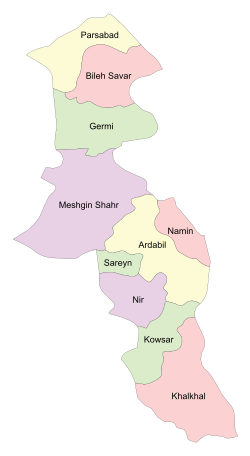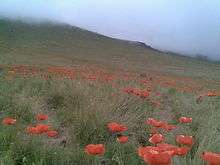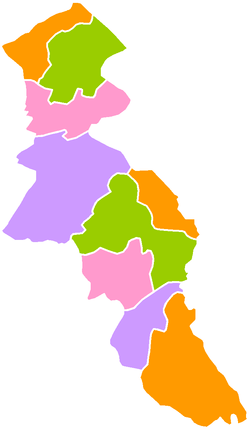Ardabil Province
| Ardabil Province استان اردبیل | |
|---|---|
| Province | |
 | |
 Location of Ardabīl within Iran | |
| Coordinates: 38°15′05″N 48°17′50″E / 38.2514°N 48.2973°ECoordinates: 38°15′05″N 48°17′50″E / 38.2514°N 48.2973°E | |
| Country |
|
| Region | Region 3 |
| Capital | Ardabil |
| Counties | 10 |
| Government | |
| • Governor | Majid Khodabakhsh |
| • MPs of Parliament | Ardabil Province parliamentary districts |
| • MPs of Assembly of Experts | Ameli & Mousavi |
| • Representative of the Supreme Leader | Hassan Ameli |
| Area | |
| • Total | 17,800 km2 (6,900 sq mi) |
| Population (2011)[1] | |
| • Total | 1,248,488 |
| • Density | 70/km2 (180/sq mi) |
| Time zone | IRST (UTC+03:30) |
| • Summer (DST) | IRST (UTC+04:30) |
| Main language(s) |
Persian (official) local languages: Azerbaijani (Majority) Tati Talysh |
Ardabil Province (Persian: استان اردبیل Ostān-e Ardabīl; Azerbaijani: اردبیل اوستانی) is one of the thirty-one provinces of Iran. It is in the northwest of the country, in Regions 3, bordering the Republic of Azerbaijan, the provinces of East Azerbaijan, Zanjan, and Gilan.[2] Its administrative centre is the city of Ardabil. The province was established in 1993 from the eastern part of East Azerbaijan.
Climate and geography
Many tourists come to the region for its cool climate (max 35 °C) during the hot summer months. The winters are bitterly cold, with temperatures plummeting to −25 °C.
Its famous natural region is the Sabalan mountains. The province is considered the coldest province in Iran by many. Large parts of the province are green and forested.
Athletes such as Ali Daei and Hossein Rezazade are originally from Ardabil.
Ardabil's capital stands about 70 km from the Caspian Sea and has an area of 18011 km². Neighbouring the Caspian Sea and the Republic of Azerbaijan, the city is of political and economic significance.
History

The natural features of the province of Ardabil are mentioned in the Avesta, according to which Zoroaster was born by the river Aras and wrote his book in the Sabalan Mountains. During the Islamic conquest of Iran, Ardabil was the largest city in Azarbaijan, and remained so until the Mongol invasion period.
Shah Ismail I started his campaign to nationalize Iran's government and land from here, but consequently announced Tabriz as his capital in 1500 CE. Yet Ardabil remained an important city both politically and economically until modern times.
Administrative divisions
The province is divided into 10 counties: Ardabil, Bilasavar, Germi, Khalkhal, Kowsar, Meshginshahr, Namin, Sarein, Nir, and Parsabad. District of Arasbaran was transferred to the province of Ardabil from East Azerbaijan in 2010 and now appears on the more recent maps of Ardabil Province produced by the Iranian official organs.
Culture

Ardabil is the seat of the sanctuary and tomb of Shaikh Safî ad-Dîn, eponym of the Safavid Dynasty Kulliye. It has many hot springs and natural landscapes which attract tourists. The mineral springs of Ardabil are Beele-Darreh, Sareyn, Sardabeh and Booshloo, which are known throughout Iran for their medicinal qualities. It also has a number of lakes: the largest of which are Ne'or, Shoorabil, ShoorGel, NouShahr and Alooche, which are the habitats of some species of water birds.
Lake Ne'or is located in a mountainous area 48 km south-east of the city of Ardabil. It covers an area of 2.1 km² and has an average depth of 3 metres. It is fed by springs in the lake bed. Lake Shoorabil is located in a hilly area south of the city of Ardabil and covers an area of 640,000 m². The surface of the lake is covered with a thin white layer of minerals, which is useful for healing skin diseases and rheumatism. Near the lake there is the leisure complex of Shoorabil. Ardabil is a city of great antiquity. Its origins go back 4000 to 6000 years (according to historical research in this city). This city was the capital of Azerbaijan province in different times, but its golden age was in the Safavid period.
One of the most ancient cities in Iran is Meshkin Shahr. It is located in the north-west of Iran in Azerbaijan, 839 kilometers from Tehran. It is the closest city to the Sabalan mountains. In the past, it was called "Khiav", "Orami", and "Varavi".
The most important places to visit in the district of Meshkin Shahr are the following : – The hot water springs of Moiel, Eelando and Qaynarja, located in the suburb of the city. – Qara Soo River Sides. – The spring of Qotur Suie, located 42 kilometers from Meshkin shahr. – The old Castle of Meshkin Shahr. – Qahqaheh castle, located 80 kilometers from Meshkin Shahr. – Deev castle, located in Kavij. – The petrograph of Shapour Sasani in Meshkin Shahr. – The old cemetery in Oonar. – The tomb of Sheykh Haydar in Meshkin Shahr. – Imamzadeh Seyyed Soleyman.
The other significant historical monuments are as follows: the mausoleum of Sheikh Jebra'il, located 2 km north of Ardabil, the old but always lively bazaar, the babadavood anbaran, the Friday mosque, and a few ancient bridges. In addition to these, in many villages of Ardabil, including Sadeqlu, relics of ancient monuments, including tombs, have been found.
Colleges and universities
- Ardabil University of Medical Sciences
- Mohaghegh Ardabili University
- Islamic Azad University of Ardabil
- Payam Noor University of Ardabil
- Soureh University of Ardabil
- Islamic Azad University of Khalkhal
Language
The primary language of Ardebil province is Azerbaijani, a branch of Turkic.[3][4][5] Other languages in Ardabil include Tati and Talysh.[6]
References
- ↑ Selected Findings of National Population and Housing Census 2011 Archived 2013-05-31 at the Wayback Machine.
- ↑ "همشهری آنلاین-استانهای کشور به ۵ منطقه تقسیم شدند (Provinces were divided into 5 regions)". Hamshahri Online (in Persian). 22 June 2014 (1 Tir 1393, Jalaali). Archived from the original on 23 June 2014. Check date values in:
|date=(help) - ↑ Iran A Country Study, Author Federal Research Division, Edition reprint, Publisher Kessinger Publishing, 2004, ISBN 1-4191-2670-9, ISBN 978-1-4191-2670-3, Length 340 pages
- ↑ Encyclopedia of the Stateless Nations: S-Z Volume 4 of Encyclopedia of the Stateless Nations: Ethnic and National Groups Around the World, James Minahan, ISBN 0-313-31617-1, ISBN 978-0-313-31617-3, Author James Minahan, Publisher Greenwood Publishing Group, 2002, ISBN 0-313-32384-4, ISBN 978-0-313-32384-3, Length 2241 pages
- ↑ "CIAO".
- ↑ "Talysh".
External links
- Encyclopedia of Orient About Ardabil
- Ardabil-Iran Carvan Tourism at the Wayback Machine (archived March 29, 2006)
- Ardabil entries in the Encyclopædia Iranica
- site of meshkin shahr at the Wayback Machine (archived July 16, 2008)
- site of khalkhal
- site of ardebil
| Adjacent places of Ardabil Province | ||||
|---|---|---|---|---|
 |
|
 | ||
| East Azerbaijan Province | |
|||
| ||||
| | ||||
| Zanjan Province | Gilan Province | |||


